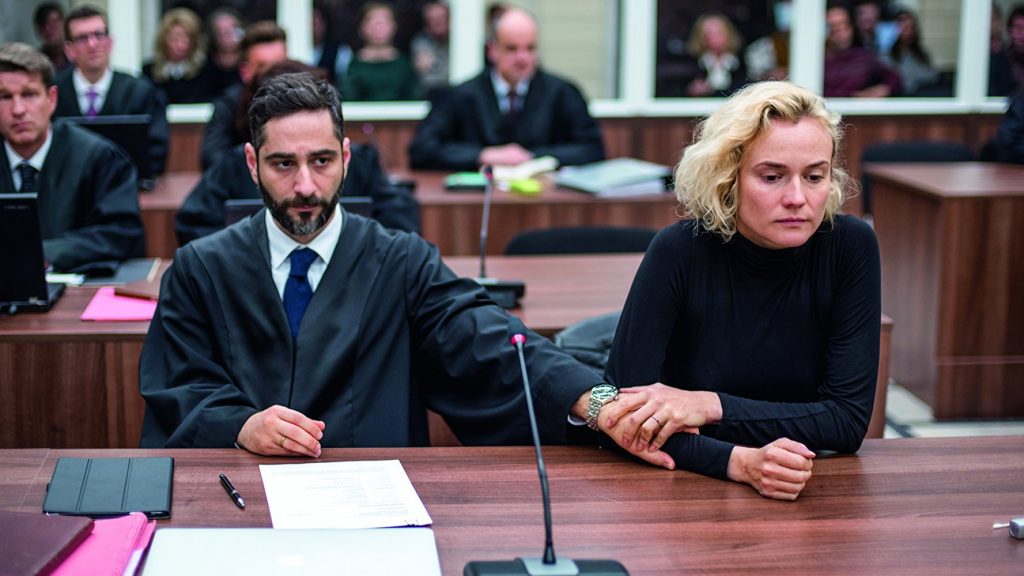Reviewed by Lee Hill
As clichés go, “revenge is a dish best served cold” ranks as one of the more vacuous. History is full of countless examples of eye for an eye retribution. Acts of vengeance may simmer. but are rarely far from boiling point. Much of the debate around how to deal with terrorism and its causes strives to get opponents to the negotiating table on the basis that endless retribution is futile. Yet the violence continues, and it is this all too human endgame that makes In the Fade such compelling viewing despite its missteps.
Faith Akin, best known for Head-On, is a Turkish writer/director who lives in Germany. That background gives him a first-hand awareness of how immigration and the recent refugee crisis can both unite and divide citizens. In the Fade, a spiritual cousin of the taut political melodramas of Sidney Lumet and Costa-Gavras, is an ambitious look at European neo-Nazi and the alt-right at large targeting Muslims and other ethnic groups.
In the Fade unfolds over three distinct chapters. In the first, The Families, we meet Katja Sekerci (Diane Kruger), who is married to Nuri (Numan Akar), a Kurd and ex-drug dealer who served a few years in prison before reinventing himself as a legal advisor to other immigrants. Their happiness is destroyed when Nuri and her child, Rocco (Rafael Santana), are killed in a nail bomb attack. In the second section, Justice, Katja, who is now reusing drugs to numb her grief, joins her lawyer (Denis Moschitto), to ensure the killers, a young couple, are put in jail. Although Katja was an unsuspecting witness to the placement of the bomb hidden in a parked bicycle, the defense lawyer, played with cruel logic by Johannes Krisch, convinces the judges to acquit the accused. In the final section of the film, The Sea, Katja follows the couple to Greece where they have gone to avoid the negative publicity from the trial. Denied closure and desolated by the loss of her family, Katja begins to plot her revenge on those who destroyed her life.
In the Fade works best in its depiction of grief as a landscape of constant mutation. Katja, as portrayed with remarkable energy by Kruger, is like an explorer in an unmapped frontier. Kruger is given many emotional chords to play thanks to the astute casting of secondary roles; the husband and son (seen in home video flashbacks), Moschitto’s resolve as the lawyer, an empathetic detective (Henning Pekar), a judgmental mother (Karin Neuhauser) and traditional in-laws, Ali (Asim Demirel) and Hülya (Aysel Iscan). As the neo-Nazi couple, Hanna Hisldorf and Ulrich Brandhoff convey how the idealism of young love could curdle into extremism. Ulrich Tukur, as the father of one of the bombers, is the closest to knowing the despair Katja is experiencing. While these actors only have a few scenes each, their presence makes the points that some of the clumsier plot contrivances don’t.
Despite being marketed as such, In the Fade, avoids being an arty version of Death Wish. A few plot twists are signaled a bit too broadly – such as the ease with which Kruger’s characters fixes and build small electronic devices or her knack for surveillance. There is also an annoying title card that takes away from the irony of the harrowing ending.
Kruger deservedly won Best Actress at last year’s Cannes Film Festival 2017, but the film received a mixed reception. A year on from Cannes’ critical snake pit, In the Fade can be seen as a sensitive and original look at how decent, compassionate individuals are forced to come to grips with a need for redress that traditional justice may not satisfy.
In The Fade is in Cinemas from Friday 22nd of June.
